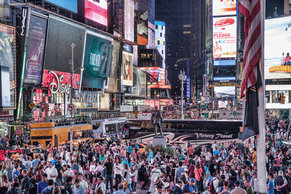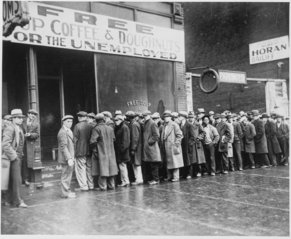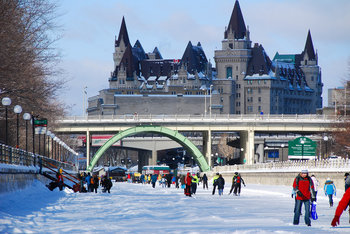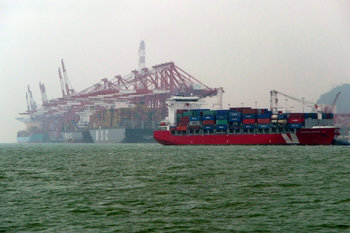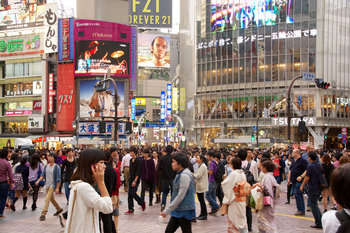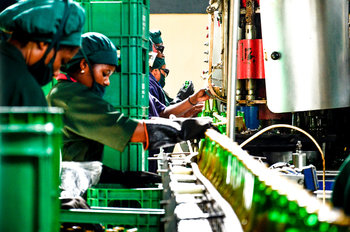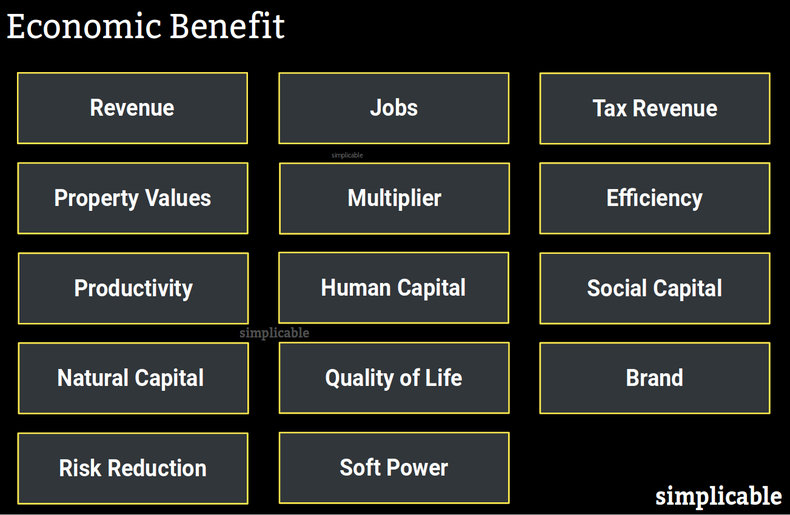
Revenue
Revenue for businesses. For example, an annual festival that generates $7 million in revenue for local businesses such as hotels, restaurants and shops.Jobs
Jobs created including short term work and long term sustainable jobs. For example, a proposed theme park that will generate 4,000 construction jobs for two years and 6,000 permanent positions.Tax Revenue
Tax revenue can be viewed as a benefit to a community such as a proposed entertainment complex that will pay an estimated $2 million a year in local taxes.Property Values
An increase in the price of property is a benefit for those who currently own houses. For example, a plan to improve air quality and develop more green spaces in a city or neighborhood may raise the value of property.Multiplier
Increased revenue and jobs tend to a have secondary benefits such as increased revenue, jobs, property values and tax income. For example, if a new factory employees 10,000 people those people will spend money with local businesses, buy local houses and pay local taxes. This may further increase employment by several thousand jobs in the area.Efficiency
Improvements to social and hard infrastructure may increase the efficiency of an economy. This may be measurable as a benefit. For example, a port improvement project may reduce transportation costs for local businesses by $2 billion per year making a city more competitive.Productivity
Productivity relates to the efficient use of time. For example, a high speed rail project that reduces travel time between two major cities may save passengers 2 million hours a year. With a baseline assumption such as an hour is worth $20 this represents an economic benefit of $40 million a year.Human Capital
Human capital is the productive capacity of labor. Improvements in health and education increase human capital. For example, a developing country may experience an economic boom after improving their infant mortality rate with better medical supplies, practices and facilities. Human capital can be estimated as the present value of all future GDP generated by an addition to the talent pool of a nation or city.Social Capital
Social capital is goodwill, fellowship and communication that is essential to economic processes and quality of life. This is difficult to value but an economic benefit of social capital can sometimes be estimated. For example, a student in Texas who learns to speak reasonably fluent Mandarin Chinese may significantly raise their long term contributions to GDP. This can be estimated as an economic benefit of language education programs.Natural Capital
Natural capital is the world's stock of natural resources. This has inherent value to survival and quality of life. A small fraction of this value can currently be estimated with a dollar amount. For example, each elephant that is lost to poachers may cost a nation $14 million in lost tourism revenue. As such, programs to prevent this from happening have clear economic benefits that can be estimated.Quality of Life
The quality of life of a nation or city can be measured in terms of resident perceptions such as surveys that poll life satisfaction and happiness. This correlates with the ability of a city to attract businesses, investment, talent and tourists. It is also the foundation of property values. For example, a city that reduces crime with education programs, after school programs, work experience programs and adult education initiatives may attract more investment, high net-worth residents, talented employees and tourists. These effects can all be estimated in terms of city GDP or future tax revenues.Brand
Nations and cities may view their reputation using brand concepts and estimate the value of their reputation using brand value. This can be used to model the economic benefit of anything that improves your reputation. For example, an awareness campaign targeted at local residents that explains the importance of tourism to the local economy may improve attitudes towards tourists. This may translate to improved visitor satisfaction and an increase in the overall brand value of the city. Likewise, campaigns to inform tourists of local customs and rules may improve the overall visitor experience.Risk Reduction
Economic benefits can be calculated by identifying risks, estimating risk and then reducing that risk. For example, a city has a 40% probability of an earthquake that will cause $1 trillion in damage. This represents a risk exposure of $400 billion. A program to improve building standards may reduce this to a 40% probability of an earthquake that will cost $10 billion in damage for a risk exposure of $4 billion. This represents an economic benefit of $396 billion in reduced risk exposure.Soft Power
Soft power is the ability of a nation to influence without threat of military force. This is known to be extremely valuable but is currently difficult to estimate. In theory, an estimate model could be produced based on the relationship between soft power levels and the economic growth of a nation. This could be used to calculate the economic benefit of programs such as foreign assistance and cultural exchange programs that can increase soft power.Notes
Economic benefit analysis is open to criticism that it reduces the human experience to a dollar amount. For example, it is common to state the impact of a disease that causes much human suffering and loss of life as a dollar estimate based on healthcare costs and labor lost to the disease. This can be viewed as cold logic that is insensitive to the human condition. To avoid this, it is possible to also state benefits in human terms such as survival, health, education and other quality of life outcomes.| Overview: Economic Benefit | ||
Type | ||
Definition | An advantage of a program, strategy, policy, activity or event that can be expressed as a financial amount. | |
Related Concepts | ||

